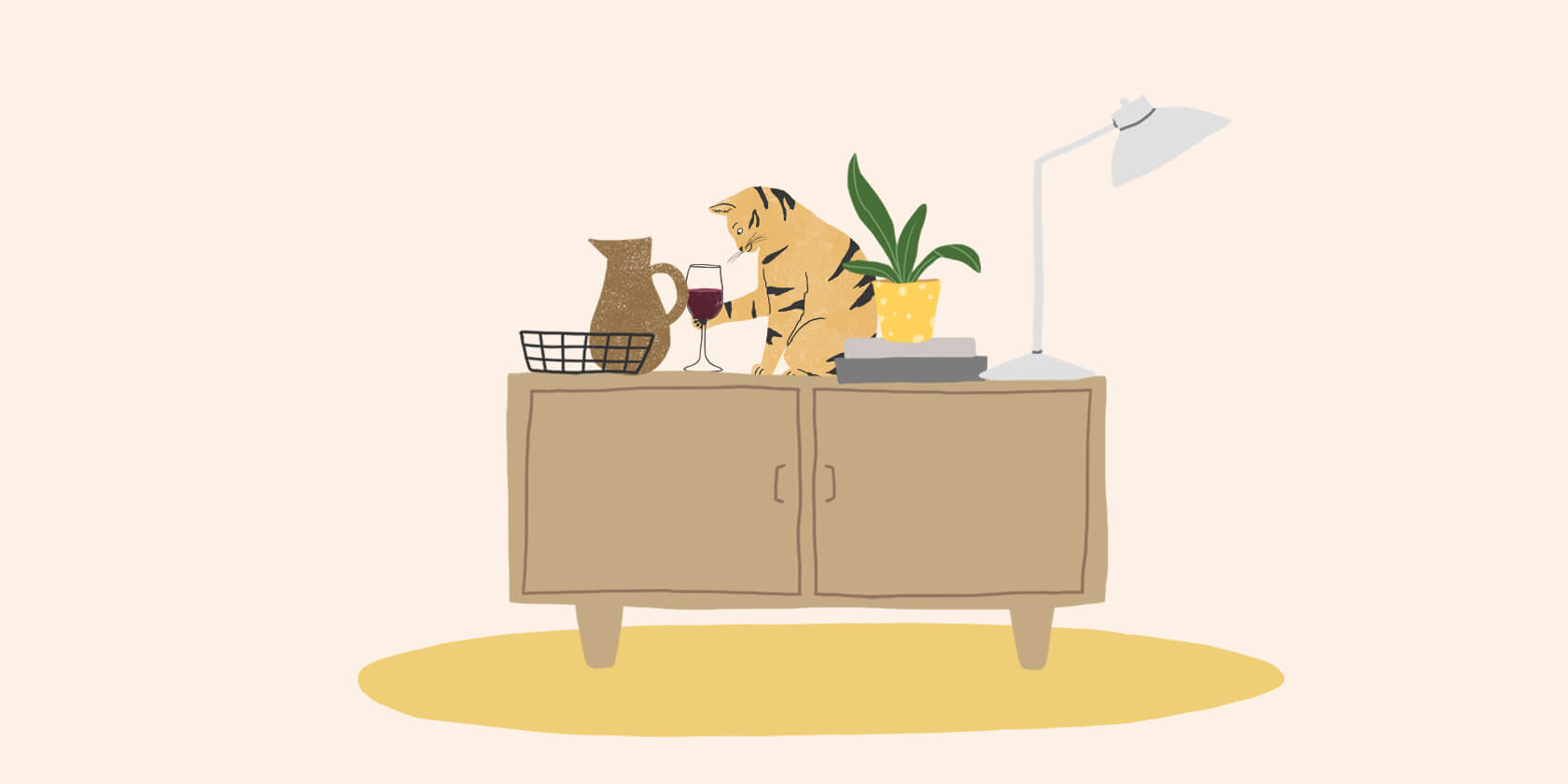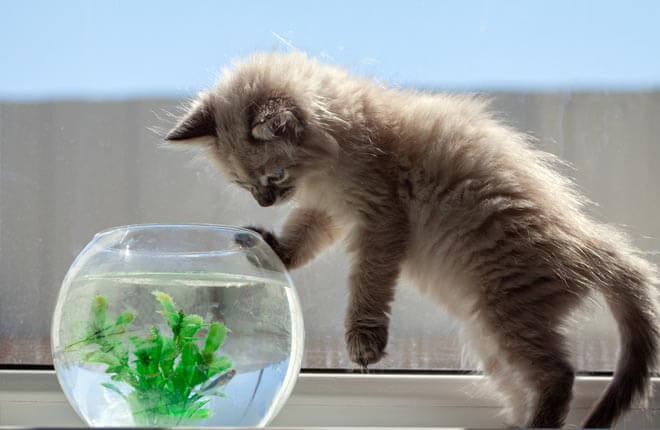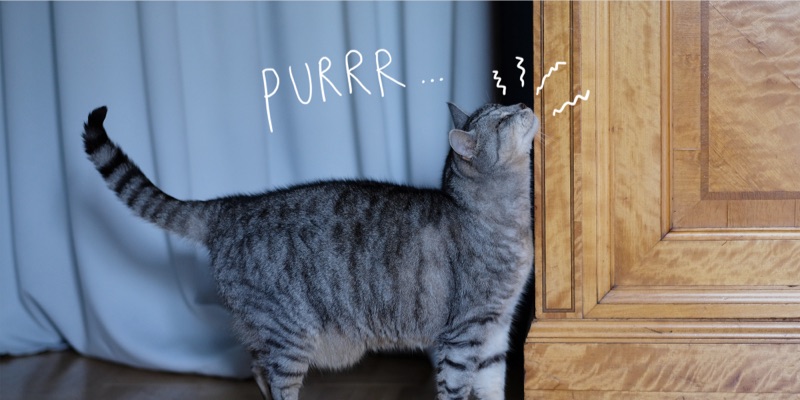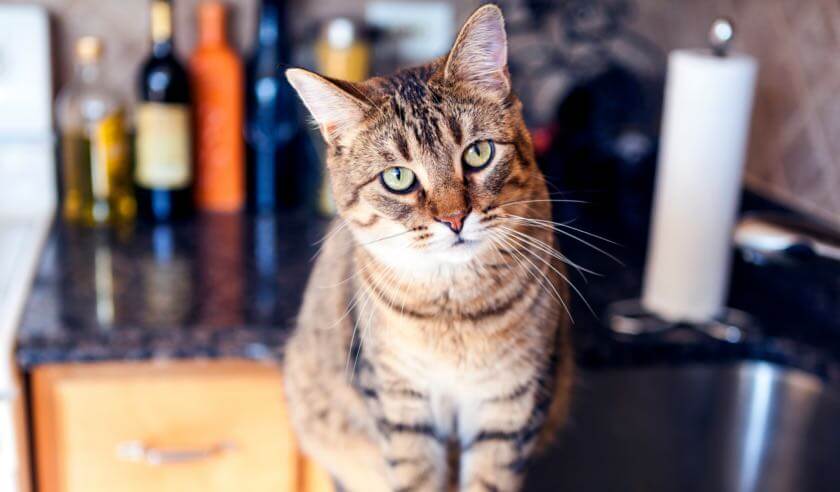Cat antics are legendary — they sleep on our heads, knead our bellies, dart from room to room as if chasing some invisible target, and knock things over without any apparent rhyme or reason.
Your cat knocking a pen off the desk can be amusing. However, amusement quickly turns to frustration (and possibly even anger) when a prized knickknack ends up broken on the hardwood floor or a glass of water is spilled on the computer.
Why do cats knock things over? Does their curiosity get the better of them? Is it that they can’t help themselves? Are they trying to annoy us, doing it out of spite, or trying to be destructive? What can be done to prevent it?

Curiosity and Fun
Cats are naturally curious. Sometimes it doesn’t even take a new thing in the house to arouse their curiosity. It can be as simple as rearranging the items on your desk that spurs their desire to investigate with their paws. The result may be your nicely organized papers scattered on the floor, your pen holder turned over, and your cat lying proudly on your computer keyboard.
Not only do these escapades reflect the natural curiosity of your cat, but also self-directed fun.
New items in your home or a reorganized layout can become a playground of mental stimulation for your cat.
Hunting Instinct
Cats are hunters by nature. Starting in kittenhood, they sharpen their hunting skills of stalking, investigating, chasing, pouncing, and capturing, often using inanimate objects in their environment. Consider this familiar scenario: your cat spots a pen on the desk, stares intently at it, hunkers down, swishes their tail ever-so-slightly, and inches closer. After deciding it’s safe, they investigate with a tentative push of the paw. The pen begins to roll and swirl. This movement causes your cat to run after, pounce on, and capture their “prey.” And then the pen “escapes” by flying off your desk — which triggers a rush in your cat.
Although this behavior can be annoying, remember your cat is just practicing natural hunting skills.
Boredom
Another possible reason for cats knocking things over could be boredom. This often stems from a lack of environmental enrichment. Consider cats who don’t routinely have access to their own dedicated vertical spaces, like a cat tree — they’re more likely to climb onto cabinets and shelves, which often house breakables and have limited space to safely move. A cat may cause items to go crashing to the floor simply by bumping into them as they move along the cabinet or shelf. Or they may stop to “play” with grandma’s glass figurine that has grabbed their attention.
To Get Attention
In some cases, your response when your cat knocks something over may influence this behavior, especially if they want more playtime and attention.
Most of us respond to a falling household object by jumping into action – whether we see it or not. We’ll try to catch a water glass falling off the table before it hits the floor and we’ll get up from our comfy chair to investigate the source of the noise when something hits the ground. This makes knocking things over an easy way for your cat to get your attention. Once a behavior has been reinforced, the cat knows that they can repeat it to get the desired outcome.
Preventing Cats from Knocking Things Over
Many steps can be taken to prevent your cat from knocking things over:
- Cat-proof your home. Keep items you love (or want to keep intact) in a safe place, away from the edges of shelves and tables where they’re more likely to be knocked off. And watch for things that can be dangerous to your cat, like sharp objects, glass that can break easily, and certain houseplants.
- Daily play sessions. Have regular play sessions with your cat, choosing toys that offer the same paw feedback they get from batting your knickknacks around, like wand or wire-based toys and ball-and-track toys. This relieves boredom and strengthens your bond.
- Add more mental and physical enrichment. Provide a variety of cat toys, food puzzles, and interactive games that provide mental stimulation. And rotate them by putting some away for a while and replacing them with different ones. This way, your cat has new toys and puzzles regularly.
- Provide cat-designated vertical spaces. This may be a cat tree or a vertical wall shelf that they can climb and call their own, which may help prevent them from scaling the bookcases and other places you keep your special items. A perch with a view of the bird feeder is another option.
- Redirect behavior. If you catch your cat eyeing a knickknack or raising a paw toward the stack of papers on your desk, redirect them with interactive play or give them a food puzzle before they act.
Do not reinforce the behavior with negative attention. Although this is difficult, don’t react when your cat does knock something over. Pick up the fallen item when the cat is not there. If it’s dangerous and needs to be picked up immediately, do so calmly while not acknowledging your cat. Negative reinforcement or scolding is never appropriate as it can damage the bond between you and your cat and still will not solve the underlying problem.
ZPC-01380R1



.jpg)

